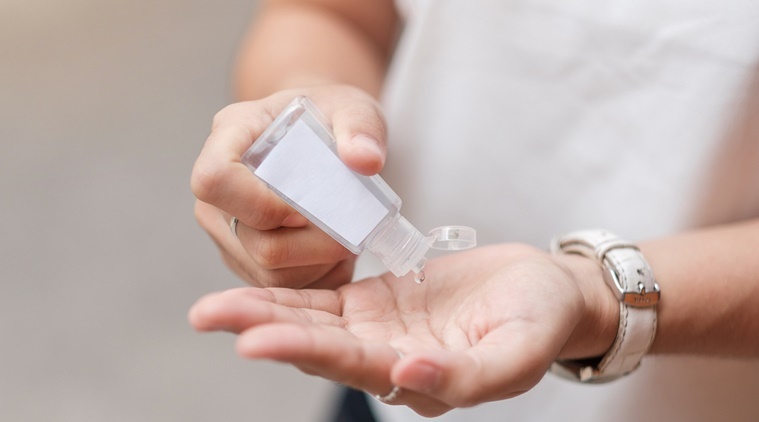Recently a 44-year-old man suffered 35 per cent burn injuries to his face, neck, hands and chest in Haryana’s Rewari when he spilled hand sanitiser on his kurta while standing near a stove in the kitchen. While it could be a one-off incident, it highlights the need to use hand sanitisers with care. Indianexpress.com reached out to experts on the same who explained how sanitisers, which have been “aggressively come to be hoarded” in the wake of the coronavirus scare and mandatory requirement of maintaining hand hygiene practices, “are inflammable” because of the alcohol content”. While World Health Organization (WHO) recommends hand washing with soap and water is good enough, the demand of hand sanitisers have reportedly seen a spike.
Dr Udgeath Dhir, director and head, CTVS, Fortis Memorial Research Institute, Gurugram said, “The alcohol content should be 60-65 per cent for the sanitiser to be effective. While it is inflammable because of the alcohol content, as soon as we rub our hands, the alcohol content evaporates.”
Why does WHO recommend handrubs at all?
As per WHO’s Guide to Local Production: WHO-recommended Handrub Formulations, it is necessary due to
*Evidence-based, intrinsic advantages of fast-acting and broad-spectrum microbicidal activity with a minimal risk of generating resistance to antimicrobial agents;
*Suitability for use in resource-limited or remote areas with lack of accessibility to sinks or other facilities for hand hygiene including clean water, towels etc.
*Capacity to promote improved compliance with hand hygiene by making the process faster, more convenient and immediately accessible at the point of patient care
*Economic benefit by reducing annual costs for hand hygiene, representing approximately 1 per cent of extra-costs generated by health care-associated infection
*Minimisation of risks from adverse events because of increased safety associated with better acceptability and tolerance than other products.
Why do most sanitisers use alcohol?
Alcohol is effective at killing different types of microbes, including both viruses and bacteria due to its ability to unfold and inactivate their proteins. The process is known as denaturation. As per WHO, at present, alcohol-based handrubs are the only known means for rapidly and effectively inactivating a wide array of potentially harmful microorganisms on hands.
So what kind of handrub should you be using?
“Those who are using a spray instead of a tube will be more likely to catch fire as spray tends not to evaporate as quickly and more amount of sanitiser is dispensed through spray,” stated Dr Dhir.
What is the correct way to use handrubs?
As per WHO guidelines, one needs to rub their hands for 15 to 30 seconds with sanitiser. Dr Dhir gives an acronym for the practice ‘TRAPS’.
T – Tips of fingers
R – Rub your hands, palms and dorsal part of your hand
A – Adequate amount of sanitiser
P – Proper time spent sanitising
S – Spray in between fingers
What precautions can one take?
Considering the ethyl content that makes them flammable, people should not use sanitisers near a place with a fire. After use, they should be allowed to dry, mentioned experts.
Also, since hands tend to become dry, there is a need to keep moisturising, advised Dr Dhir.
Agreed Dr Rinky Kapoor, consultant dermatologist, Cosmetic Dermatologist and dermato-surgeon, The Esthetic Clinics. She said, “While we are not disputing the effectiveness of hand sanitisers as an emergency on –the –go way to clean your hand, regular use can actually do more damage than good.,“ she said.
She listed some concerns. vis-a-vis sanitisers.
Strips the skin of its natural barrier
Since hand sanitisers contain over 60 per cent of alcohol, it breaks down the essential proteins and lipids on the skin, thus weakening its natural ability to fight outside infections.
Makes the skin dry
Alcohol in hand sanitisers irritates and dries out the skin. This makes it susceptible to cracks and contact dermatitis.
Prone to sunburn
Too much use of hand sanitisers can make your skin sensitive to UV light. This happens because the alcohol thins the layers of the skin and makes it easier for sun rays to penetrate deep in the skin of your hands.
Speeds up the ageing process
Dryness, sensitivity to sunlight, lack of natural hydration can lead to increased appearance of fine lines, wrinkles, cracks, and flakiness on hands.
Causes allergies
Hand sanitisers are a mix of alcohol and chemicals and since manufacturers need not dictate what ‘fragrance’ they are using, you don’t know what you are putting on your hands. “Some ‘alcohol-free’ hand sanitisers use triclosan instead of alcohol. This product is used in cleaning agents and in pesticides. It can penetrate in the skin layers and cause allergic reactions,” stated Dr Kapoor.
She went on to further explain how sanitisers don’t clean the food residue. “The drying alcohol in hand sanitisers kills the bacteria but does not break down the greasy and sugary food residue. Therefore, when you touch your hands to the face, this residue gets transferred and causes acne and breakouts on the skin,” she said.
Given these concerns, should you be using sanitisers at all?
“Nothing beats the good old-fashioned way of washing hands with soap and water. It cleans away the residue and does not over dry the skin. However, with the recent scare , it is good to use hand sanitisers , especially if you come in contact with many people daily. Our advice is to use it only when necessary and prefer the option of washing and moisturising wherever necessary. Consult your dermatologist for options of hand sanitisers before giving up on them completely. Remember it’s always better to be safe than sorry,” said Dr Kapoor.










